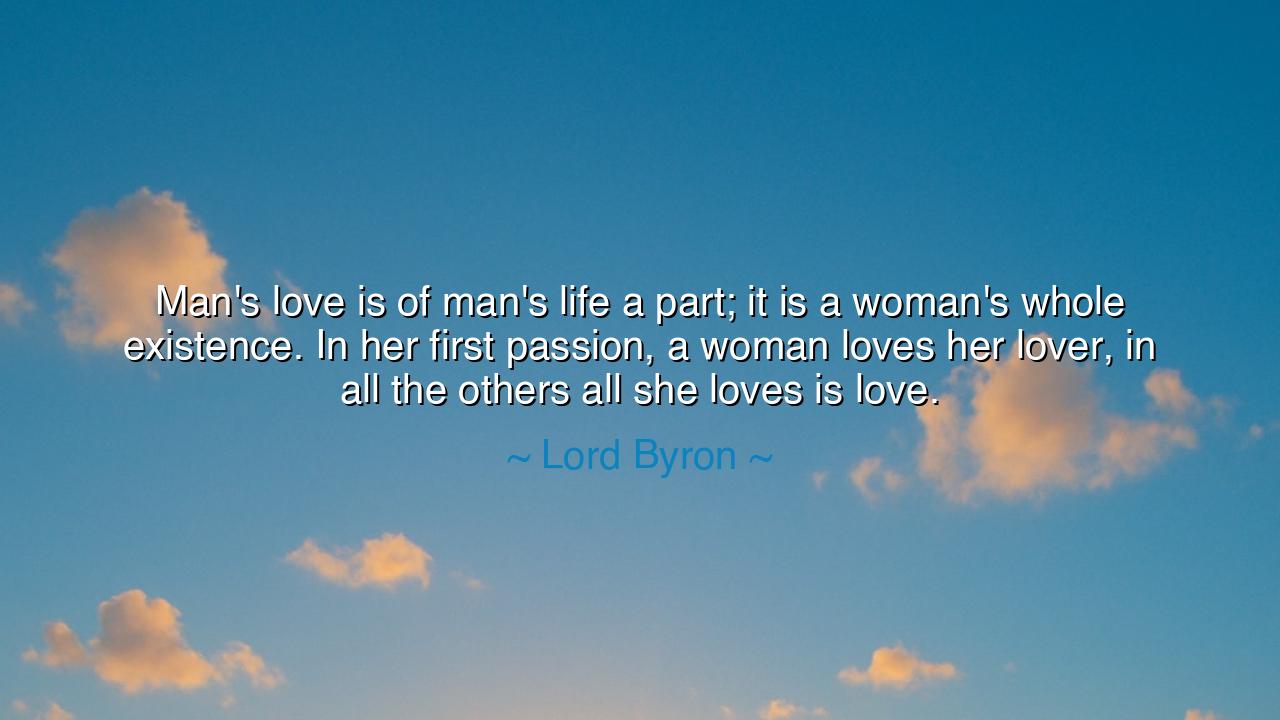
Man's love is of man's life a part; it is a woman's whole
Man's love is of man's life a part; it is a woman's whole existence. In her first passion, a woman loves her lover, in all the others all she loves is love.






"Man's love is of man's life a part; it is a woman's whole existence. In her first passion, a woman loves her lover, in all the others all she loves is love." — thus wrote Lord Byron, the tempestuous bard of passion and sorrow. In these words lies not a judgment, but an observation carved from the heart of human experience. Byron, whose soul knew both ecstasy and ruin, spoke of love as the great force that defines and divides the hearts of men and women. His words, like an ancient oracle, unveil the timeless struggle between the fleeting and the eternal, between desire and devotion.
In the heart of man, love is but one thread woven into the broader tapestry of ambition, honor, and conquest. To him, it is a flame that burns brightly, yet shares its light with other fires — of duty, of glory, of selfhood. But in the heart of woman, said Byron, love becomes the sun itself, around which all her stars revolve. Her spirit, once kindled, does not merely glow — it consumes. Her love is not an event; it is a transformation. It is not a part of her life — it is her life. And therein lies both her grandeur and her suffering.
Consider the story of Cleopatra, the queen of Egypt, whose intellect could rival any ruler, and yet whose fate was sealed not by empire, but by love. When she met Antony, her passion became her universe. To him, love was a mighty pleasure; to her, it was existence itself. When he perished, she did not flee to rule alone — she followed him into death. In her final act, she embodied Byron’s truth: that for some women, love is not a chapter of life, but the very script of being.
Yet Byron’s words speak also of transformation through time. “In her first passion, a woman loves her lover,” he says — in youth, her heart clings wholly to the one who awakens it. Her love is personal, fierce, and entire. But as the years teach their lessons, and loss leaves its silent marks, her love changes shape. In later years, she loves not a man, but love itself — the idea, the remembrance, the divine echo of affection that once set her soul ablaze. This is not weakness, but wisdom. She has seen the transient face of passion and learned to revere the eternal essence that lies beneath it.
There is something profoundly noble in this — the way the feminine heart transforms pain into poetry, loss into understanding. The woman who loves love is no longer bound by form or face; she has ascended into a realm where affection itself becomes sacred. The mystic Sappho, exiled on her lonely isle, sang not merely of lovers lost, but of love as the spirit of life. Her verses trembled with longing not for a man, but for beauty itself — for that universal connection that binds soul to soul.
But beware, for Byron’s truth cuts both ways. To make love one’s entire existence is divine — yet dangerous. For when love departs, what remains? When the heart lives only for another, it risks annihilation in their absence. Thus the wise must learn balance — to love deeply, yet not lose the self entirely. The woman who loves wholly must remember that her spirit is vast, her essence not confined to the affection of one. To love as the ancients taught — with tenderness, but also with strength — is the way of endurance and grace.
So let this be the teaching: Love, but do not vanish in love. Let your passion illuminate, not consume. Let love be both devotion and discovery — a force that reveals who you are, not erases you. Remember that love’s truest form is not dependence, but recognition — the soul seeing itself in another and rejoicing. When love comes, greet it as a guest divine; when it departs, bow with reverence, and continue your walk in wisdom.
For Byron’s words, though written of men and women, speak to all humankind: that love, whether part or whole, is the measure of our aliveness. And though the forms of it may differ — for some a fire, for others a life’s purpose — the task remains the same: to love bravely, to lose with dignity, and to live with a heart still open to the next dawn.






AAdministratorAdministrator
Welcome, honored guests. Please leave a comment, we will respond soon